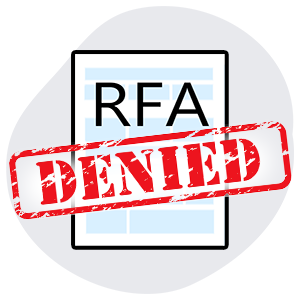UR Data Supports CA Legislators' Fears

As early as 2016, California legislators were aware of potential abuse of the Utilization Review (UR) process.
These legislators attempted to address the problem by enacting laws requiring the Division of Workers’ Compensation (DWC) to collect data from claims administrators on every UR decision and to publish denial data by January 1, 2024. But as discussed extensively in this space, the DWC failed to do as instructed.
However, UR data collected by daisyBill suggests California legislators were 100% correct to be concerned about possible UR abuse.
Data from hundreds of thousands of UR decisions that claims administrators (or their URO vendors) sent to daisyAuth providers in 2022 and 2023 reveal patterns regarding how claims administrators conduct UR — and raise questions regarding whether medically necessary treatment is being inappropriately denied.
No Data, No Solutions
In 2016, to determine whether claims administrators improperly deny medically necessary care recommended by treating physicians, California legislators passed Senate Bill 1160, amending Labor Code Section 4610 to instruct the DWC to create a means of electronically collecting UR decision data.
In 2019, California enacted Senate Bill 537, adding Labor Code Section 138.8 to require the DWC to publish UR denial data by January 1, 2024.
The legislators recognized that without UR data, there could be little helpful insight into claims administrators’ patterns of UR decision-making. Accordingly, they demanded that the DWC gather credible UR denial data for “the implementation of best-practices across the system” that “will lead to improvements for injured workers who are having their care delayed or denied.”
But so far, the DWC has failed to implement a system that can capture the UR denial information necessary to adhere to Labor Code Sections 537 or 138.8.
Unfortunately, without UR data, California can only rely on incomplete or anecdotal evidence to identify UR problems and improve the system. Even worse, injured workers throughout California are the victims of the DWC's failure to adhere to California laws that could improve access to care.
daisyAuth UR Denial Data Available
While daisyBill has published plentiful verified anecdotal evidence of questionable UR decisions, we also have access to UR data that could be helpful to legislators with a genuine interest in investigating and correcting UR issues.
daisyBill providers use daisyAuth technology to request authorization for over 2,000 treatments daily. This technology also tracks and documents the UR decisions claims administrators or their UROs send in response. Accordingly, daisyAuth has mountains of UR denial data to share with legislators.
Data from hundreds of thousands of RFAs reveal the following UR denial statistics:
- In 2022, 600+ claims administrators in our system collectively denied 21% of providers’ requested treatments, approving treatment only 71% of the time.*
- From January to July 2023, claims administrators denied 22% and approved just 70% of daisyBill providers’ requested treatments.*
- Denial rates can vary wildly from one claims administrator to another. For example, from January to July 2023, Athens Administrators denied 41% of requested treatments, while Intercare Holdings Insurance Services denied only 9%.
*The remaining UR decisions modified or delayed the requested treatment or disputed liability.
Even though the DWC has not acted to set up the mandated UR database, daisyBill is happy to share our verifiable UR data with any interested party.
No Standardized UR Form = No Granular UR Data
To request authorization, the DWC requires physicians to submit a standardized RFA form that this agency developed. However, the DWC allows claims administrators to send physicians unstandardized, often mind-numbingly long, UR decisions filled with medical mush.
While daisyAuth data includes hundreds of thousands of UR denial decisions, using technology alone, it is impossible to parse these non-standardized documents, which often exceed 10 pages. Instead, humans must comb through the documents to extract pertinent information, including the denial reasons given by claims administrators or their UROs.
To adhere to California laws demanding UR data, the DWC must take the essential step of standardizing the format of UR decisions sent in response to providers’ RFAs. Without a universal UR decision form, how can the DWC possibly comply with Labor Code Sections 4610 and 138.8.?
CA Legislators Want Improvements for Injured Workers
California legislators saw the problem in 2016. And while comments from analyses of SB 1160 stopped short of impugning the entire UR system, these legislators recognized that at the very least, bad actors or company-level incompetence may be harming injured workers — and only comprehensive data can point to the culprits (emphases ours).
“...both injured workers and medical providers report delays and denials of medical care due to the UR process. While existing research does not support the argument of significant delays or denials due to UR, recent research suggests that, while such delays and denials may not be system-wide, they may be specific to certain employers or UR entities.
“This data will make possible targeted audits and legislative initiatives that address unnecessary medical disputes, while preserving important protections against unnecessary and abusive medical treatment.”
The DWC's adherence to California law to collect credible and verifiable UR data would be a significant step toward ensuring that (someday) California’s injured workers get a fair shake.
Submit RFAs in 30 seconds and automatically track UR decisions with daisyAuth. Request a demo below!
DAISYAUTH DEMO
DaisyBill provides content as an insightful service to its readers and clients. It does not offer legal advice and cannot guarantee the accuracy or suitability of its content for a particular purpose.
.gif)
.gif)


